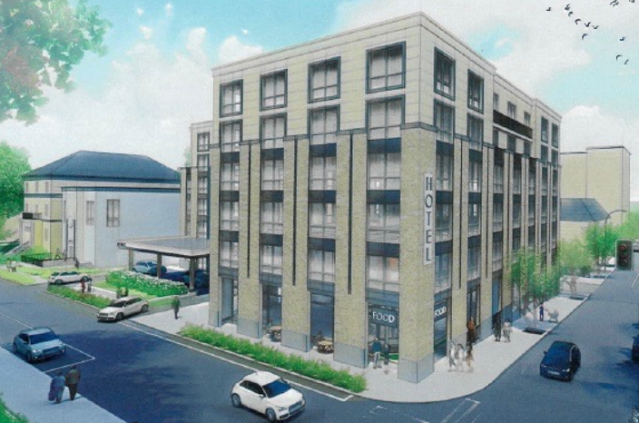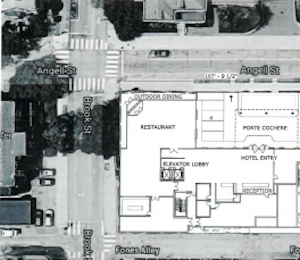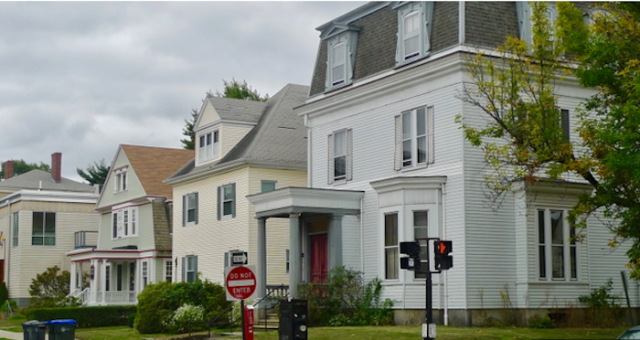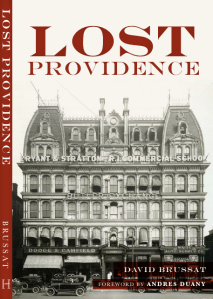
Hotel proposed to replace three old houses at Angell and Brook streets on College Hill. (ZDS)
Lippitt House, at Hope and Angell, hosted the College Hill Neighborhood Association’s community meeting to hear about and comment on a hotel proposed by Edward F. Bishop and Smart (we’ll see) Hotels at Angell and Brook. Ed Bishop is a longtime resident and booster of the neighborhood, but his six-story hotel, if built as illustrated in Monday’s presentation, will continue trends that threaten the quality of life in College Hill.

Plan of proposed hotel. (ZDS)
The danger comes not so much because three old houses (including Bishop’s insurance office) would be demolished. That’s a basic problem with this proposal and most other projects completed on the East Side in recent decades. The danger is that the hotel’s bland appearance would not make up for the loss of the three old houses, and would pave the way for more blandness. The loss of the houses would be more bearable if the hotel’s design were more elegant – if it lived up to the standards of the neighborhood.
The design looks cheesy, but that’s hard to tell from architectural drawings. If it is to live up to community standards, the hotel’s cornice should be more ornate, the windows should be narrower, more vertical, not horizontal, with more panes per window. This would enable an additional rank of windows, separated by slenderer piers, decorated by pilasters, and with a more robust base. If the massing cannot offer a sense of movement, the window reveals should be deep enough to suggest strength. That’s just for starters. The color scheme is fine, with its natural hues. Too many new buildings seek to fake animation by introducing contrasting color schemes. Not this hotel (so far).
It was encouraging to hear, toward the beginning of the presentation, that the design is preliminary and that “colors and materials” were not yet final. But later, answering a question from a skeptical audience, project architect Eric Zuena insisted that he would not be designing a hotel that “copied the past.” He said that as if he thought it would give him the cooties. He said his intention is to design a “transitional” building. This was bad news. Without realizing it, Zuena let the cat out of the bag. His word “transitional” means that not much would change from the initial bland design.
Zuena, like almost all architects today, believes new design which follows architectural traditions that evolved over hundreds of years is illegitimate – “not of our time.” Such an attitude condemns every old building we love in Providence to illegitimacy. For centuries, all new buildings “copied the past.” Zuena no doubt would object that he loves the city’s historical buildings as much as the next guy, and he probably does. But if so, why does he oppose designing new buildings in traditional styles? Such opposition cannot be justified. So he wants to have it both ways – to be seen as forward-looking without seeming to disdain the architecture that even he must admit makes Providence Providence and not, say, Hartford or Worcester.
That’s why he proposes a “transitional” hotel. And that’s why a “transitional” hotel, designed to satisfy both the traditional and the transitory in taste, is sure to satisfy nobody. Constant fascination arises from the psychology of developers and their hired architects, and the more local the project, the more rewarding is its examination.
The hotel’s proponents ardently fear a battle over their project similar to the one that has hobbled the proposed Fane tower in the Jewelry District. Quite understandable. They want to have the community on their side. But then why are the drawings being shown to the public so bland? If the proponents had started with a beautiful set of drawings, they would have the community on their side by now – all but those who are dead set against losing any old houses (a perfectly valid stance). If they ended up building a beautiful hotel, then they could charge higher room rates and perhaps recoup the cost of a lovelier hotel. If they eventually had to dumb it down, the community would be disappointed but the developers would already have won the battle.
So who knows why the initial drawings are so bland. Maybe the developers really did not believe the community would object. You’d think developers and their architects would be genuinely receptive to local opinion, but most of them haven’t the faintest idea what real people think. They live in silos impervious to views that contradict the fallacies architects learned in school or the dollar-centric environment that nurtures developers. Faulty ideas go unchallenged by architects’ professional associations and the architectural media. The public be damned, and if not damned, ignored. It used to be that developers, and architects, tried to satisfy clients and the public. The reverse today is true, and so development strategies feature obfuscation rather than clarity, complexity rather than simplicity and honesty. To admit wanting a “transitional” hotel is to be unusually frank, but that doesn’t make it good.
Nothing would help Providence more than a hotel project that teaches the public that beauty has not been lost to the march of time but is as valid and as feasible today as it was yesterday. One of my correspondents always ends her emails with this motto: “It is not good because it is old, it is old because it is good.” A hotel will live longer and profit more, its developers will be more respected, if it becomes part of the city’s infrastructure of love.
Perhaps the objections raised at Lippitt House will penetrate, and we’ll see improved drawings next time around that reflect what the College Hill community deserves.

Three houses on Angell Street at risk in proposal for a hotel on College Hill. (William Morgan)



is there some appropriate site for a hotel in the area that does not involve tearing down old houses (maybe parking lot?) and maybe at a less congested street corner?
To do reduce parking demand can the city mandate employees be offered a transit pass? There are at least 5 bus lines that go to the area.
I also wonder, since this is near Brown with its eco-concerns, about incorporating solar energy into the design, is it possible to do this that benefits both the design and the environment?
LikeLike
If that were my project, I’d be urging the developer to keep the corner house as it provides cachet for a new design that wrapped around behind it. It could provide better entry, foyer, restaurant and bar areas inside than any new hotel ground floor. That would be a win-win for both neighbourhood and developer!
LikeLike
Excellent summation David! The proposal is inarticulate and therefore inadequate. There is no mystery here. Zuena and Friends need merely to look around them for inspiration. A hotel design akin to The Viking in Newport, or the Hawthorne in Salem, MA is called for. College Hill deserves better.
LikeLike
Thank you, Michael. And yet even the proposed hotel design is far, far superior to almost any modernist hotel design that could possibly be imagined for that location.
LikeLike
Well stated, David. Even though only the large white house would be a notable loss, the hotel design does not approach blending into the immediate neighborhood or the larger College Hill context.
As you state, “Nothing would help Providence more than a hotel project that teaches the public that beauty has not been lost to the march of time but is as valid and as feasible today as it was yesterday.”
It appears there was no thought given to the architectural beauty of the area. I point to the facade of the new Beatrice hotel downtown as a broad blueprint to emulate.
Although I steadfastly avoid using the word Providence (world class) with Hartford or Worcester (bland basic cities), as it is insulting to the city we love, I get your point. And fully agree.
LikeLike
Steve, regarding Worcester and Hartford I see your point too. And yet the vital thing to know is that both Hartford and Worcester were once probably in the same league as Providence as far as architectural beauty is concerned. Hartford and Worcester are merely farther along the downward incline that is inevitable when a city embraces bland and/or modernist architecture. Anybody who loves the beauty of Providence must argue vociferously against its continuing to follow Hartford, Worcester and many other cities down this same path.
LikeLike
Or you could convert the houses into bed and breakfasts.
LikeLiked by 1 person
Yes, but that probably does not involve the kind of room rate revenue that the developers envision. Yet it could be done, and the middle building could be renovated (or restored) to raise its beauty to the level of its neighbors.
LikeLike